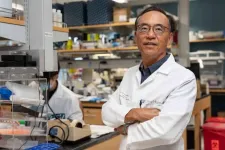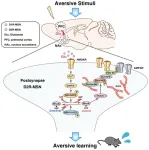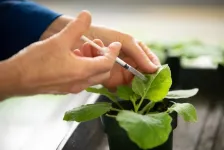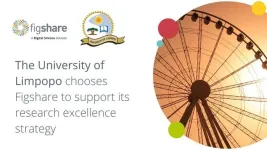(Press-News.org) LOS ANGELES — A team of researchers from City of Hope®, one of the largest and most advanced cancer research and treatment organizations in the U.S., and The University of Texas M.D. Anderson Cancer Center, have reported safety and efficacy results from a Phase 1 trial that featured a personalized vaccine to treat lymphoplasmacytic lymphoma, a rare and slow-growing type of blood cancer, according to a study published recently in Nature Communications.
The current approach to lymphoplasmacytic lymphoma care is active surveillance of a patient’s possible symptoms. There is a median time of 3.5 years from diagnosis to progression of symptoms — such as fever, night sweats, weight loss and fatigue — that require chemotherapy.
“By doing an early intervention with the vaccine, we nearly doubled the disease-free progression time to an average of just under seven years,” said Larry Kwak, M.D., Ph.D., director of City of Hope’s Toni Stephenson Lymphoma Center within the Hematologic Malignancies Research Institute, who developed the vaccine and is the study’s corresponding author. “In addition to being effective, the vaccine appears to be safe. It didn’t have any of the harsh side effects associated with other types of common cancer treatments.”
Toxicity among trial participants was also limited, Dr. Kwak said. That’s because the vaccine uses patient-specific biologic components called tumor neoantigens that can help the body mount an immune response to a particular tumor type.
The clinical trial, led by M.D. Anderson, enrolled nine patients, who were able to tolerate the therapy without negative side effects. After a median follow up of 7.5 years, all of the patients had stable disease and more than half had not progressed to a symptomatic state.
“Using sophisticated technology called single-cell sequencing, we could see that these personalized vaccines activated T cells in the tumor microenvironment, which help destroy tumor cells,” said Dr. Kwak, who is also the deputy director of City of Hope's comprehensive cancer center and the Dr. Michael Friedman Professor in Translational Medicine. “Furthermore, we saw that the tumor cells rely on signaling from myeloid cells to survive, which we didn’t know before, and the vaccine reduced that protumoral signaling, too.”
According to Dr. Kwak, disease progression was halted and one patient had a minor reduction in tumor shrinkage. The research teams believe this is because two different subtypes of cells give rise to tumors in lymphoplasmacytic lymphoma — mature B cells and plasma cells — and the vaccine only had an effect on the B cell population.
“The takeaway from that observation is that when we do the next phase clinical trial, we will want to combine the vaccine with another agent that does have more of a direct effect on plasma cells, like a monoclonal antibody,” he said.
Dr. Kwak and the research team are working on the next generation of the vaccine for a possible clinical trial that may take place at City of Hope. As part of a Sponsored Research Agreement with Renhaim Inc., Dr. Kwak and team plan to adapt the vaccine to an mRNA platform, which has become a new frontier for vaccine production since the original was developed using DNA nearly a decade ago. The team is also exploring additional therapies to pair with the neoantigen for more vaccine efficacy. Dr. Kwak is a paid consultant with Renhaim Inc.
The neoantigen vaccine research builds upon three decades of investigations by Dr. Kwak, who is a world-renowned physician and pioneering scientist in immunology and cancer vaccines. Dr. Kwak was named one of TIME magazine’s “100 Most Influential People” in 2010 for his work in cancer immunology.
In 2011, Dr. Kwak and colleagues published research in the Journal of Clinical Oncology on the first iteration of the neoantigen vaccine. It was a protein-based vaccine for follicular lymphoma that garnered positive results.
“It was actually one of the first positive cancer vaccine positive trials in the field, but 15 years ago, no drug company was interested in talking with us about a personalized vaccine,” Dr. Kwak said. He noted that the “one drug for one patient” model was a tough sell until CAR T cell therapies set a precedent for individualized cancer medicines. “Now they're much more open to it. I think the future of cancer vaccines is really in this kind of setting, where we’ve shown the effectiveness of early intervention as a way to prolong and maybe even prevent progression to symptomatic disease.”
The research reported in the Nature Communications paper, “Personalized neoantigen vaccines as early intervention in untreated patients with lymphoplasmacytic lymphoma: a non-randomized phase 1 trial,” was supported by the National Cancer Institute and the International Waldenstrom’s Macroglobulinemia Foundation.
# # #
About City of Hope
City of Hope's mission is to make hope a reality for all touched by cancer and diabetes. Founded in 1913, City of Hope has grown into one of the largest and most advanced cancer research and treatment organizations in the U.S. and one of the leading research centers for diabetes and other life-threatening illnesses. City of Hope research has been the basis for numerous breakthrough cancer medicines, as well as human synthetic insulin and monoclonal antibodies. With an independent, National Cancer Institute-designated comprehensive cancer center that is ranked top 5 in the nation for cancer care by U.S. News & World Report at its core, City of Hope brings a uniquely integrated model to patients, spanning cancer care, research and development, academics and training, and innovation initiatives. City of Hope’s growing national system includes its Los Angeles campus, a network of clinical care locations across Southern California, a new cancer center in Orange County, California, and cancer treatment centers and outpatient facilities in the Atlanta, Chicago, and Phoenix areas. City of Hope’s affiliated group of organizations includes Translational Genomics Research Institute and AccessHopeTM. For more information about City of Hope, follow us on Facebook, X, YouTube, Instagram and LinkedIn.
END
Climate change is forcing people to adapt to changing environmental conditions. But what really makes the difference is how they do it. The recently published Hamburg Climate Futures Outlook 2024 by 73 authors shows that, in the long run, only sustainable adaptation can succeed. This global assessment by University of Hamburg’s Cluster of Excellence Climate, Climatic Change, and Society (CLICCS) also provides practical recommendations.
“Successfully adapting to the impacts of climate change is just as difficult and challenging as reducing emissions of every kind,” says Anita Engels, Professor of Sociology ...
Carnegie Mellon University Africa announced today that the African Engineering and Technology Network (Afretec) has signed its eighth university partner, Al Akhawayn University. The network, launched in 2022, provides a vehicle for technology-focused universities in Africa to engage in deep collaboration to drive inclusive digital growth, create technology development and job growth, and shape policy change.
Afretec Network members span the entire continent and include Carnegie Mellon University Africa, the American University in Cairo, Université Cheikh ...
CLEVELAND—With a new four-year, $1.14 million grant from the U.S. Department of Veterans Affairs, researchers at Case Western Reserve University and the Louis Stokes Cleveland VA Medical Center, will use artificial intelligence (AI) to determine the best personalized treatment for Veterans with rectal cancer.
Colorectal cancers are the third-most common type of cancer in military personnel, affecting up to 8% of Veterans and 5% of active-duty Service members, according to the American Cancer Society (ACS). More than 152,000 patients in the United States will be diagnosed with colorectal cancer in 2024, with more than 46,000 localized ...
COLUMBUS, Ohio – For the first time, scientists are able to directly compare the different kinds of injury that mechanical ventilation causes to cells in the lungs.
In a new study, using a ventilator-on-a-chip model developed at The Ohio State University, researchers found that shear stress from the collapse and reopening of the air sacs is the most injurious type of damage.
This miniature “organ-on-a-chip” model simulates not only lung injury during mechanical ventilation, but also repair and recovery, in human-derived cells in real time, said co-lead author ...
Enrollment of low-income, undocumented students declined by half at University of California and California State University campuses from 2016 through the 2022-23 academic year, according to a new study by the University of California Civil Rights Project at UCLA and UC Davis School of Law.
The paper, “‘California Dreamin’: DACA’s Decline and Undocumented College Student Enrollment in the Golden State” is believed to be the first to report on data collected during an era marked by increasing limitations on DACA, or Deferred Action for Childhood Arrivals.
Further, researchers found, for UC and CSU low-income undocumented ...
One of the things that makes brains so incredibly difficult to understand is their ability to adjust and adapt. Our learning experiences can set off complex signaling cascades that reshape neurons—and their synaptic connections—at the cellular level. For example, in mammals, scientists have established that activation of the N-methyl-D-aspartate receptor (NMDAR) and the ensuing calcium ion (Ca2+)-dependent signaling cascade is essential for postsynaptic remodeling and learning. As one might reasonably expect, ...
Samarium (Sm), a rare earth metal, is important to organic chemists because of the ability of its divalent compounds to efficiently perform single-electron transfer reductions. Samarium iodide (SmI2) is moderately stable and can operate under mild conditions at room temperature, making it highly useful for producing pharmaceuticals and biologically active materials. However, most reactions require SmI2 in quantities equal to or greater than the stoichiometric amount and necessitate the use of harmful chemicals, making the process resource-intensive and expensive to manage.
Several approaches have been studied to reduce ...
Scientists have learned how plants keep viruses from being passed to their offspring, a finding that could ensure healthier crops. The discovery could also help reduce the transmission of diseases from mothers to human children.
Plant viruses are often able to spread from one country to another through the seed trade. As a result, parent-to-progeny disease transmission is of global concern.
“Viruses can hide in seeds for years, making this one of the most important issues in agriculture,” said UC Riverside distinguished professor Shou-Wei Ding in the Department of Microbiology and Plant Pathology. Ding is corresponding author of a new paper about the ...
HOUSTON – (Sept. 19, 2024) – Rice University and Baylor College of Medicine have received $2.8 million in funding from the National Heart, Lung, and Blood Institute (NHLBI), a division of the National Institutes of Health (NIH), for research on reducing inflammation and lung damage in acute respiratory distress syndrome (ARDS) patients.
The study, titled “Cell Based Immunomodulation to Suppress Lung Inflammation and Promote Repair,” will be co-led by Omid Veiseh, a professor of bioengineering and faculty director of the Rice Biotech Launch Pad, and Ravi Kiran Ghanta, a professor of surgery at Baylor. ...
Figshare, a leading provider of institutional repository infrastructure that supports open research, is pleased to announce that the University of Limpopo has chosen Figshare to facilitate the collection, management, sharing and preservation of its research data.
The University of Limpopo – one of the top public universities in South Africa offering undergraduate and postgraduate qualifications, and a variety of short learning programmes – will become the 20th institution in the country using Figshare as their data repository.
Using ...







